This page is dedicated to some stories passed down from my dad and his brothers, as well as a few of my own that I’ll be adding periodically. They may occasionally have something to do with the history or operation of the theatre, but most are just funny, heartwarming or unusual tales that I believe are worth sharing.
Enjoy,
Tom Alexander
______________________________________________________________________
THE BIG DECISION AND THE POSTMASTER GENERAL OF THE U.S.
In the early 1930s, Alec Alexander, the eldest son of Thomas Alexander was working at several theatres his father had owned and operated at one time, but know longer was affiliated with. After a series of disappointments and no real opportunities for advancement, he convinced his father to come out of retirement to build one last theatre — a legacy cinema for the community and the family. Alec had worked for the Comerford Theatres Corporation for sometime. Comerford had long been a partner of his father’s, as they had opened several theatres together. However, Alec learned soon enough that working for Comerford as opposed to partnering with Comerford were two very different scenarios. Alec, infuriated that he’d been passed over by Comerford for the bigger opportunities, drove to Scranton, Pennsylvania to confront top boss, M.E. Comerford once and for all. His father came along for the ride. They walked right past Comerford’s first line of defense, his personal secretary, and marched into his office. A shouting match ensued almost immediately. In the office at the time, was the Postmaster General of the United States under FDR, Frank Walker, a first cousin of Comerford. Walker had long respected the Alexander’s enviable track record as exhibitors, and amazingly, took Alec’s side in the dispute.
Before things escalated any further, the two sides agreed to partner one last time, and fulfill Alec’s and Thomas’ dream of a legacy theatre. They would build it in Forty Fort. Groundbreaking ceremonies took place in the Spring of 1936, and on January 29, 1938, the Forty Fort Theatre opened for business.
DAD AND THE JAPANESE MONSTERS
In the early to mid 1970s there was probably no bigger fan of Japanese monsters (especially Godzilla) than me. It’s no wonder there was such an uptick in the frequency of monster movies for the Saturday matinees at the Forty Fort Theatre. My dad was keenly aware of my passion for the genre and did his level best to book a sufficient number of flicks depicting mighty monsters smashing buildings and battling each other, all while frightened Japanese citizens ran for cover. Good stuff.
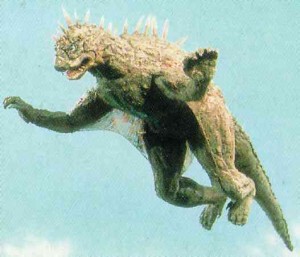
Hospodar? I recall dad’s rendering of the mythical creature looking vaguely like obscure Japanese monster, Varan.
I enjoyed long conversations with my dad about this and other important topics. When we were in Greece in the Summer of 1972, I recall asking him who his favorite Japanese monster was. I expected the standard answer; Godzilla, Rodan, Mothra, you know, the ones on the hit parade. He thought long and hard. Then he told me, and the long Summer of Wonder began. “My favorite is Hospodar.” he said. Hospodar? Now, for an 8 year old kid who thinks he knows everything about monsters, this name was unfamiliar. Still, Dad insisted he was real. Fictional, but real. It certainly sounded authentic enough. The Mighty Hospodar!
My father had a deliciously devilish sense of humor — harmless but it stuck to the ribs. Knowing full well in these long before internet days, that the odds of me finding info on Japanese movie monsters at the nearest branch of the Athens Public Library, was slim to none, I would just have to wait it out till we returned stateside before I learned who this mythical Hospodar was. I’d prod and poke for info, but he only said, the name of the creature. I even asked him to tell me which movie he was in. “In good time” came the answer.
Then, one day, early the next spring, we were driving on Shoemaker Street in Swoyersville. My dad had to hit the brake for another car turning onto the road. And it was then, I learned exactly who/what Hospodar was. The sign was large and in plain view — Hospodar’s Auto Service. The name hit me instantly. My dad let out a big laugh. Hospodar revealed himself. It was simply a family name from Wyoming Valley. Admittedly, it did sound quite convincing, especially when you’re eight and have monster posters all over your bedroom. Except of course the one featuring Hospodar.
________________________________________________________________
MY OWN LITTLE MOVIE THEATRE
As a kid it was my dream to have my own movie theatre, just like my dad. So I built one – in a manner of speaking. I had a good friend who was handy with tools. So we built a mini proscenium arch around a makeshift screen down in my basement. I had two small Kenner Easy Show movie projectors.
We even installed a small curtain, and I drew a Greek Key on it designed after the one at the Forty Fort Theatre. I had an eight track player that played similar music to the kind we played at the theatre as well. I had shows on school nights, because on weekends, I was at my dad’s theatre. I recall having my dad at the grand opening of the theatre, which I dubbed the Shavertown Cinema. He was really supportive, and said it was “a great training ground for me operating my own theatre some day.” Of course after we closed Forty Fort, that never happened. But the Shavertown Cinema provided some fun moments with my friends in the neighborhood.
__________________________________________________________________
THE PRESSURE IS ON!
It was summer of 1977. We were playing one of the big blockbusters of that year, Smokey and the Bandit starring Burt Reynolds, Jackie Gleason, Sally Field and Jerry Reed. Our regular projectionist, Phil Humphrey, was ill and was unable to make it one particular Saturday night. In a case like that, the theatre owner normally just places a call to the projectionist’s union and a replacement projectionist is provided. Well, unfortunately, no one was available. According to union rules, non-union projectionists are not allowed in the projection booth. Only theatre ownership (if properly trained) can operate their own equipment. Well, my dad and his brothers had long forgotten how to thread projectors, fire up the lamp house, make changeovers from one projector to the next, and so on. But I knew how. Now, technically, I wasn’t an owner. My dad was. So he stood over my shoulder in the booth the entire night as I ran the movie – nervously. I was a little frightened, but I managed to pull it off flawlessly; No missed changeovers from reel to reel, no dark screens, sound intact.
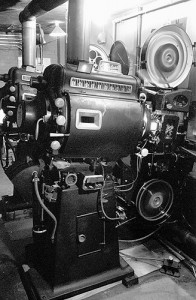
Boy in the Booth. These Peerless Magnarc projectors are very close to the same models we had a the Forty Fort Theatre. I’ll need to unearth some photos of the projection booth. I’m sure I’ve got something – somewhere.
Then, when the late performance ended, my dad’s oldest brother Alec, rewarded me with his monthly company dividend. I was stunned. It was the most money I ever held in my hand up to that point in my life. My dad grabbed the bulk of it leaving me with five dollars. “This is going toward your college fund,” Dad said. For a thirteen year old kid it felt like magic – like in some weird way I was responsible for the audience having a great time – and a turning point in my days at the theatre.
______________________________________________________________________
SIXTEEN CENTS EARNED
Modern transportation has it advantages. It did back in the 1920’s and 1930’s as well. The going rate was eight cents streetcar fare for a one way to ride from the West Side over to the train station or bus depot in Wilkes-Barre. When it was time to pick up or return the cannisters of film my grandfather chose to transport them on foot. After all, what’s a two mile walk in each direction when you can save up a total of thirty-two cents a week? That’s more than sixteen dollars a year. But that’s how my grandfather thought. He had mouths to feed and thirty-two cents a week back in those days actually had some value.
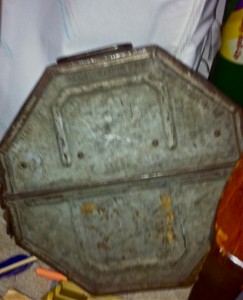
Unearthed from a crawl space sits a typical single reel can of film. Imagine carrying a three reeler with each arm for two miles.
The film cans were heavy. Trust me. I’ve walked them up a couple flights of stairs myself. Imagine carrying them a couple of miles just to save streetcar fare. But he did it. His own children couldn’t believe it. He didn’t want help either. “This isn’t children’s work,” he told them. “It was man’s work.” And he was undoubtedly some kind of man.
_____________________________________________________________________
THE THING THAT WOULDN’T MOVE
Sounds like one of those cheap Saturday afternoon matinees. But its not.
When the 1972 Hurricane Agnes flood hit the Wyoming Valley, the Forty Fort Theatre wasn’t spared. It took two months to get the theatre up and running after an exhaustive cleanup. The force of the raging water was stunning as a several ton candy stand was dislodged from its “permanent” position in the lobby, and the four hundred pound soda machine was found on its back. But one free standing item refused to be budged; A green, monolithic ticket stub grinder that didn’t move an inch. It wasn’t affixed to the floor, it just sort of — stood there. The grinder was built like a Sherman tank and withstood the swirling currents the flood brought.
Though it had to be thoroughly cleaned and sterilized (like everything else), this steel behemoth remained in the lobby until the theatre closed in 1988 as an art deco beacon of a long lost age and a reminder of good old fashioned American craftsmanship.
In a related story – the old ticket grinder held an odd fascination for many children. They would often want to see what was “under the hood” so to speak. They’d crank away on the wheel that would grind the ticket stubs. This always amused my dad (Peter Alexander). He couldn’t resist indulging their curiosity and would often jokingly refer to Bixel, the friendly giant that lived at bottom of the machine. This was of course followed by their puzzled looks, a smile, then an apology. He’d respond saying that it made Bixel happy knowing their were people way up in the outside world. Then, they’d walk into the auditorium to watch the movie. Personally, I never saw Bixel. But I still believe in him.
______________________________________________________________________
THE SECRET DOOR
I recall this sweet story that dates back to my youth. Since it centers around a specific movie, I went back into our film records and discovered it occurred on December 12, 1973.
In a town like Forty Fort, everybody knows everybody. Parent’s trusted their children in the capable hands of my dad, his brothers and the staff at the Forty Fort Theatre. And since my dad knew practically all of the kid’s families who showed up for the children’s matinees, he felt it was important to also keep an eye on their well being.
That Saturday, we were playing a stinker of a movie called The Secret Door (released by Allied Artists with an 72 minute running time for you film trivia enthusiasts).
It was an all-plot, no thrills, poorly executed flick. But, it was aptly titled for one reason. My dad noticed one of the kids coming in who didn’t have quite enough change in his pocket for admission (let alone a treat to enjoy) walking into the lobby, past the concession stand with his head down. This child was a regular who always seemed to struggle to pull enough funds together to see the weekly matinee.
Satisfied the other kids were out of earshot, my dad called this young boy by name and told him he had just walked through “the secret door” and he was a lucky prize recipient – “winning” a free box of popcorn. I remember the child’s eyes lighting up. My dad never let on that he knew the child came from a poor family or made the gift seem like charity. Instead, he made the kid feel like a winner with a promotion that didn’t even exist until he had concocted it in his mind just seconds earlier. It was truly a masterfully clever, warm and beautiful gesture of sweet generosity I will never forget. I think it brought happiness to that boy as well.
______________________________________________________________________
LOCKED IN
In the mid 1960’s, Taki Alexander was called at 3:15 in morning by the Forty Fort police because of an “incident” at the theatre.
Now it may not sound like much of an attention grabber. But let’s back up a few hours. A teenage boy whose parents were out of town for the weekend, had come to see the 9:10 showing of the movie. Taki and the staff were closing the theatre. It was customary to check the auditorium, exit doors, and rest rooms before closing. Only the first few rows were generally left unchecked because the exit doors stopped just shy of those rows.
Unbeknownst to anyone, the teenage boy had fallen asleep in the front row – sideways over two chairs blocked from view by the seat backs.
The theatre had been closed and locked for the evening. In a windowless auditorium with no lights, the theatre is pitch black – as in no candlelight per square inch – period. Total darkness.
At 3:00 AM or so, the kid woke up in a blackness that’s probably best associated with outer space. He started screaming frantically. He somehow made it to near one of the exit doors. The commotion he caused stirred some neighbors on Dilley Street who phoned the police.
“There’s someone in your theatre,” the police told Taki.
He quickly hopped in the car and drove to the theatre where he met the police and let the frightened teen out.
Needless to say every row of seats were checked from that night on – just in case someone fell asleep. Alone. In the dark.
_____________________________________________________________________
SORRY NICK, WRONG WEEK
Movie star Nick Adams was born in Nanticoke, Pennsylvania, about a twenty minute drive from the Forty Fort Theatre. Adams career got off to a good start playing opposite James Dean in Rebel Without A Cause and in the popular TV show, The Rebel.
But by the mid-60’s, his career was relegated to mainly offbeat, low-budget dramas as well as Japanese science fiction epics starring Godzilla. One such film, American International Pictures’ Frankenstein Conquers the World, was booked into the Forty Fort Theatre as a children’s matinee in the summer of 1966.
AIP boss Samuel Z. Arkoff often sent his stars on promotional tours to meet and greet fans at theatres. Adams was scheduled to visit a few theatres between Binghamton, New York and Allentown, Pennsylvania including the Forty Fort Theatre. Unfortunately, the promotional organizers never contacted the booking agent to confirm the dates, and Adams showed up a week after the film played. There was no children’s matinee scheduled that Saturday afternoon, and Adams waited for half an hour with his manager in front of the closed theatre. Oops!
________________________________________________________________________
THE CODE OF THE CANDY MAN
One of my all-time favorite theatre stories was told to me (it seems like) dozens of times by my dad and all his brothers. When my grandfather came to America from Greece, he learned the skill of being a master candy maker/chocolatier. It was a good trade, but he just felt there was something out there he might enjoy more. Of course that wound up being the movie theatre business.
While the Forty Fort Theatre was nearing completion, Edward Transue, the owner of an adjacent candy store became concerned that the new theatre and its sprawling, modern concession area would put him out of business. When my grandfather got word of this, he walked into the store to speak with the owner. “You have nothing to worry about my friend,” he told the proprietor. “You’re in business to sell candy, we’re in business to sell movies. I will encourage my patrons to buy their concessions from you.”
And so it went. My grandfather kept his promise. The Forty Fort Theatre didn’t put in a concession stand until the man retired.
A code among candy men.
Ed Note: I recently had the good fortune to connect with Peggy (Transue) Williams. She related the same story about her grandfather and also helped with some timeline issues. Thanks a lot Peggy.
_________________________________________________________________
ANYONE SEE MY DAD?
Occasionally I’ll actually have a little something to do with these stories. Apparently during my very earliest days at the Forty Fort Theatre, I took it upon myself to take center stage – in a manner of speaking. When we played our Saturday matinees, my dad would sit the three year old version of me somewhere in the first few rows of the theatre. After the first twenty minutes of the movie my attention span had reached its limit and I went looking for my dad.
Naturally, being three and pretty pint sized, I needed a good vantage point. What better place than the stage in front of the screen? I could peer out into the audience and see perfectly. I would climb the four steps to the stage and begin my search while the movie was rolling. I’d cast a shadow on the screen interfering with Hercules or Godzilla as the neighborhood kids would cheer and laugh or boo – depending on my performance I guess.
This little stage play would always end the same way. My dad would dash down the aisle and grab me off the stage and the excitement was over.
The kids resumed watching their movie. I had found my dad – who explained to me (for the tenth time) that all I had to do was look behind me.
_______________________________________________________________
“IT’S CURTAINS!” I TELL YA. “CURTAINS!!!”
The iconic curtain that “protected” the screen at the theatre was drawn by an automatic curtain puller that sat on the floor just to the right of the screen. After the 1972 Agnes flood, the machine was damaged heavily.
When the theatre reopened after the flood, it was up to one of us to pull the curtain manually to show the film. I was probably about nine when I got my first try at this task. With my dad at my side, I practically had to climb the rope to move the darn thing. But soon enough, I got the hang of it, and I no longer needed paternal supervision. There was a great sense of satisfaction when I’d time the opening of the curtain just right as the MGM lion roared or the Fox searchlights touched the sky. When we finally did get the automatic puller back online, I admit, I was a tad crestfallenThis page is dedicated to some stories passed down from my dad and his brothers, as well as a few of my own that I’ll be adding periodically. They may occasionally have something to do with the history or operation of the theatre, but most are just funny, heartwarming or unusual tales that I believe are worth sharing.
Enjoy,
Tom Alexander
______________________________________________________________________
THE BIG DECISION AND THE POSTMASTER GENERAL OF THE U.S.
In the early 1930s, Alec Alexander, the eldest son of Thomas Alexander was working at several theatres his father had owned and operated at one time, but know longer was affiliated with. After a series of disappointments and no real opportunities for advancement, he convinced his father to come out of retirement to build one last theatre — a legacy cinema for the community and the family. Alec had worked for the Comerford Theatres Corporation for sometime. Comerford had long been a partner of his father’s, as they had opened several theatres together. However, Alec learned soon enough that working for Comerford as opposed to partnering with Comerford were two very different scenarios. Alec, infuriated that he’d been passed over by Comerford for the bigger opportunities, drove to Scranton, Pennsylvania to confront top boss, M.E. Comerford once and for all. His father came along for the ride. They walked right past Comerford’s first line of defense, his personal secretary, and marched into his office. A shouting match ensued almost immediately. In the office at the time, was the Postmaster General of the United States under FDR, Frank Walker, a first cousin of Comerford. Walker had long respected the Alexander’s enviable track record as exhibitors, and amazingly, took Alec’s side in the dispute.
Before things escalated any further, the two sides agreed to partner one last time, and fulfill Alec’s and Thomas’ dream of a legacy theatre. They would build it in Forty Fort. Groundbreaking ceremonies took place in the Spring of 1936, and on January 29, 1938, the Forty Fort Theatre opened for business.
DAD AND THE JAPANESE MONSTERS
In the early to mid 1970s there was probably no bigger fan of Japanese monsters (especially Godzilla) than me. It’s no wonder there was such an uptick in the frequency of monster movies for the Saturday matinees at the Forty Fort Theatre. My dad was keenly aware of my passion for the genre and did his level best to book a sufficient number of flicks depicting mighty monsters smashing buildings and battling each other, all while frightened Japanese citizens ran for cover. Good stuff.

Hospodar? I recall dad’s rendering of the mythical creature looking vaguely like obscure Japanese monster, Varan.
I enjoyed long conversations with my dad about this and other important topics. When we were in Greece in the Summer of 1972, I recall asking him who his favorite Japanese monster was. I expected the standard answer; Godzilla, Rodan, Mothra, you know, the ones on the hit parade. He thought long and hard. Then he told me, and the long Summer of Wonder began. “My favorite is Hospodar.” he said. Hospodar? Now, for an 8 year old kid who thinks he knows everything about monsters, this name was unfamiliar. Still, Dad insisted he was real. Fictional, but real. It certainly sounded authentic enough. The Mighty Hospodar!
My father had a deliciously devilish sense of humor — harmless but it stuck to the ribs. Knowing full well in these long before internet days, that the odds of me finding info on Japanese movie monsters at the nearest branch of the Athens Public Library, was slim to none, I would just have to wait it out till we returned stateside before I learned who this mythical Hospodar was. I’d prod and poke for info, but he only said, the name of the creature. I even asked him to tell me which movie he was in. “In good time” came the answer.
Then, one day, early the next spring, we were driving on Shoemaker Street in Swoyersville. My dad had to hit the brake for another car turning onto the road. And it was then, I learned exactly who/what Hospodar was. The sign was large and in plain view — Hospodar’s Auto Service. The name hit me instantly. My dad let out a big laugh. Hospodar revealed himself. It was simply a family name from Wyoming Valley. Admittedly, it did sound quite convincing, especially when you’re eight and have monster posters all over your bedroom. Except of course the one featuring Hospodar.
________________________________________________________________
MY OWN LITTLE MOVIE THEATRE
As a kid it was my dream to have my own movie theatre, just like my dad. So I built one – in a manner of speaking. I had a good friend who was handy with tools. So we built a mini proscenium arch around a makeshift screen down in my basement. I had two small Kenner Easy Show movie projectors.
We even installed a small curtain, and I drew a Greek Key on it designed after the one at the Forty Fort Theatre. I had an eight track player that played similar music to the kind we played at the theatre as well. I had shows on school nights, because on weekends, I was at my dad’s theatre. I recall having my dad at the grand opening of the theatre, which I dubbed the Shavertown Cinema. He was really supportive, and said it was “a great training ground for me operating my own theatre some day.” Of course after we closed Forty Fort, that never happened. But the Shavertown Cinema provided some fun moments with my friends in the neighborhood.
__________________________________________________________________
THE PRESSURE IS ON!
It was summer of 1977. We were playing one of the big blockbusters of that year, Smokey and the Bandit starring Burt Reynolds, Jackie Gleason, Sally Field and Jerry Reed. Our regular projectionist, Phil Humphrey, was ill and was unable to make it one particular Saturday night. In a case like that, the theatre owner normally just places a call to the projectionist’s union and a replacement projectionist is provided. Well, unfortunately, no one was available. According to union rules, non-union projectionists are not allowed in the projection booth. Only theatre ownership (if properly trained) can operate their own equipment. Well, my dad and his brothers had long forgotten how to thread projectors, fire up the lamp house, make changeovers from one projector to the next, and so on. But I knew how. Now, technically, I wasn’t an owner. My dad was. So he stood over my shoulder in the booth the entire night as I ran the movie – nervously. I was a little frightened, but I managed to pull it off flawlessly; No missed changeovers from reel to reel, no dark screens, sound intact.

Boy in the Booth. These Peerless Magnarc projectors are very close to the same models we had a the Forty Fort Theatre. I’ll need to unearth some photos of the projection booth. I’m sure I’ve got something – somewhere.
Then, when the late performance ended, my dad’s oldest brother Alec, rewarded me with his monthly company dividend. I was stunned. It was the most money I ever held in my hand up to that point in my life. My dad grabbed the bulk of it leaving me with five dollars. “This is going toward your college fund,” Dad said. For a thirteen year old kid it felt like magic – like in some weird way I was responsible for the audience having a great time – and a turning point in my days at the theatre.
______________________________________________________________________
SIXTEEN CENTS EARNED
Modern transportation has it advantages. It did back in the 1920’s and 1930’s as well. The going rate was eight cents streetcar fare for a one way to ride from the West Side over to the train station or bus depot in Wilkes-Barre. When it was time to pick up or return the cannisters of film my grandfather chose to transport them on foot. After all, what’s a two mile walk in each direction when you can save up a total of thirty-two cents a week? That’s more than sixteen dollars a year. But that’s how my grandfather thought. He had mouths to feed and thirty-two cents a week back in those days actually had some value.

Unearthed from a crawl space sits a typical single reel can of film. Imagine carrying a three reeler with each arm for two miles.
The film cans were heavy. Trust me. I’ve walked them up a couple flights of stairs myself. Imagine carrying them a couple of miles just to save streetcar fare. But he did it. His own children couldn’t believe it. He didn’t want help either. “This isn’t children’s work,” he told them. “It was man’s work.” And he was undoubtedly some kind of man.
_____________________________________________________________________
THE THING THAT WOULDN’T MOVE
Sounds like one of those cheap Saturday afternoon matinees. But its not.
When the 1972 Hurricane Agnes flood hit the Wyoming Valley, the Forty Fort Theatre wasn’t spared. It took two months to get the theatre up and running after an exhaustive cleanup. The force of the raging water was stunning as a several ton candy stand was dislodged from its “permanent” position in the lobby, and the four hundred pound soda machine was found on its back. But one free standing item refused to be budged; A green, monolithic ticket stub grinder that didn’t move an inch. It wasn’t affixed to the floor, it just sort of — stood there. The grinder was built like a Sherman tank and withstood the swirling currents the flood brought.
Though it had to be thoroughly cleaned and sterilized (like everything else), this steel behemoth remained in the lobby until the theatre closed in 1988 as an art deco beacon of a long lost age and a reminder of good old fashioned American craftsmanship.
In a related story – the old ticket grinder held an odd fascination for many children. They would often want to see what was “under the hood” so to speak. They’d crank away on the wheel that would grind the ticket stubs. This always amused my dad (Peter Alexander). He couldn’t resist indulging their curiosity and would often jokingly refer to Bixel, the friendly giant that lived at bottom of the machine. This was of course followed by their puzzled looks, a smile, then an apology. He’d respond saying that it made Bixel happy knowing their were people way up in the outside world. Then, they’d walk into the auditorium to watch the movie. Personally, I never saw Bixel. But I still believe in him.
______________________________________________________________________
THE SECRET DOOR
I recall this sweet story that dates back to my youth. Since it centers around a specific movie, I went back into our film records and discovered it occurred on December 12, 1973.
In a town like Forty Fort, everybody knows everybody. Parent’s trusted their children in the capable hands of my dad, his brothers and the staff at the Forty Fort Theatre. And since my dad knew practically all of the kid’s families who showed up for the children’s matinees, he felt it was important to also keep an eye on their well being.
That Saturday, we were playing a stinker of a movie called The Secret Door (released by Allied Artists with an 72 minute running time for you film trivia enthusiasts).
It was an all-plot, no thrills, poorly executed flick. But, it was aptly titled for one reason. My dad noticed one of the kids coming in who didn’t have quite enough change in his pocket for admission (let alone a treat to enjoy) walking into the lobby, past the concession stand with his head down. This child was a regular who always seemed to struggle to pull enough funds together to see the weekly matinee.
Satisfied the other kids were out of earshot, my dad called this young boy by name and told him he had just walked through “the secret door” and he was a lucky prize recipient – “winning” a free box of popcorn. I remember the child’s eyes lighting up. My dad never let on that he knew the child came from a poor family or made the gift seem like charity. Instead, he made the kid feel like a winner with a promotion that didn’t even exist until he had concocted it in his mind just seconds earlier. It was truly a masterfully clever, warm and beautiful gesture of sweet generosity I will never forget. I think it brought happiness to that boy as well.
______________________________________________________________________
LOCKED IN
In the mid 1960’s, Taki Alexander was called at 3:15 in morning by the Forty Fort police because of an “incident” at the theatre.
Now it may not sound like much of an attention grabber. But let’s back up a few hours. A teenage boy whose parents were out of town for the weekend, had come to see the 9:10 showing of the movie. Taki and the staff were closing the theatre. It was customary to check the auditorium, exit doors, and rest rooms before closing. Only the first few rows were generally left unchecked because the exit doors stopped just shy of those rows.
Unbeknownst to anyone, the teenage boy had fallen asleep in the front row – sideways over two chairs blocked from view by the seat backs.
The theatre had been closed and locked for the evening. In a windowless auditorium with no lights, the theatre is pitch black – as in no candlelight per square inch – period. Total darkness.
At 3:00 AM or so, the kid woke up in a blackness that’s probably best associated with outer space. He started screaming frantically. He somehow made it to near one of the exit doors. The commotion he caused stirred some neighbors on Dilley Street who phoned the police.
“There’s someone in your theatre,” the police told Taki.
He quickly hopped in the car and drove to the theatre where he met the police and let the frightened teen out.
Needless to say every row of seats were checked from that night on – just in case someone fell asleep. Alone. In the dark.
_____________________________________________________________________
SORRY NICK, WRONG WEEK
Movie star Nick Adams was born in Nanticoke, Pennsylvania, about a twenty minute drive from the Forty Fort Theatre. Adams career got off to a good start playing opposite James Dean in Rebel Without A Cause and in the popular TV show, The Rebel.
But by the mid-60’s, his career was relegated to mainly offbeat, low-budget dramas as well as Japanese science fiction epics starring Godzilla. One such film, American International Pictures’ Frankenstein Conquers the World, was booked into the Forty Fort Theatre as a children’s matinee in the summer of 1966.
AIP boss Samuel Z. Arkoff often sent his stars on promotional tours to meet and greet fans at theatres. Adams was scheduled to visit a few theatres between Binghamton, New York and Allentown, Pennsylvania including the Forty Fort Theatre. Unfortunately, the promotional organizers never contacted the booking agent to confirm the dates, and Adams showed up a week after the film played. There was no children’s matinee scheduled that Saturday afternoon, and Adams waited for half an hour with his manager in front of the closed theatre. Oops!
________________________________________________________________________
THE CODE OF THE CANDY MAN
One of my all-time favorite theatre stories was told to me (it seems like) dozens of times by my dad and all his brothers. When my grandfather came to America from Greece, he learned the skill of being a master candy maker/chocolatier. It was a good trade, but he just felt there was something out there he might enjoy more. Of course that wound up being the movie theatre business.
While the Forty Fort Theatre was nearing completion, Edward Transue, the owner of an adjacent candy store became concerned that the new theatre and its sprawling, modern concession area would put him out of business. When my grandfather got word of this, he walked into the store to speak with the owner. “You have nothing to worry about my friend,” he told the proprietor. “You’re in business to sell candy, we’re in business to sell movies. I will encourage my patrons to buy their concessions from you.”
And so it went. My grandfather kept his promise. The Forty Fort Theatre didn’t put in a concession stand until the man retired.
A code among candy men.
Ed Note: I recently had the good fortune to connect with Peggy (Transue) Williams. She related the same story about her grandfather and also helped with some timeline issues. Thanks a lot Peggy.
_________________________________________________________________
ANYONE SEE MY DAD?
Occasionally I’ll actually have a little something to do with these stories. Apparently during my very earliest days at the Forty Fort Theatre, I took it upon myself to take center stage – in a manner of speaking. When we played our Saturday matinees, my dad would sit the three year old version of me somewhere in the first few rows of the theatre. After the first twenty minutes of the movie my attention span had reached its limit and I went looking for my dad.
Naturally, being three and pretty pint sized, I needed a good vantage point. What better place than the stage in front of the screen? I could peer out into the audience and see perfectly. I would climb the four steps to the stage and begin my search while the movie was rolling. I’d cast a shadow on the screen interfering with Hercules or Godzilla as the neighborhood kids would cheer and laugh or boo – depending on my performance I guess.
This little stage play would always end the same way. My dad would dash down the aisle and grab me off the stage and the excitement was over.
The kids resumed watching their movie. I had found my dad – who explained to me (for the tenth time) that all I had to do was look behind me.
_______________________________________________________________
“IT’S CURTAINS!” I TELL YA. “CURTAINS!!!”
The iconic curtain that “protected” the screen at the theatre was drawn by an automatic curtain puller that sat on the floor just to the right of the screen. After the 1972 Agnes flood, the machine was damaged heavily.
When the theatre reopened after the flood, it was up to one of us to pull the curtain manually to show the film. I was probably about nine when I got my first try at this task. With my dad at my side, I practically had to climb the rope to move the darn thing. But soon enough, I got the hang of it, and I no longer needed paternal supervision. There was a great sense of satisfaction when I’d time the opening of the curtain just right as the MGM lion roared or the Fox searchlights touched the sky. When we finally did get the automatic puller back online, I admit, I was a tad crestfallen.


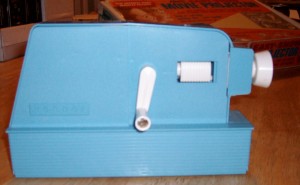
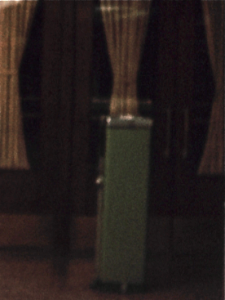
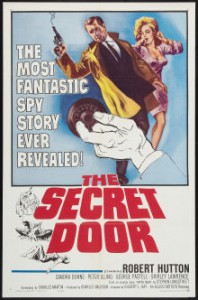

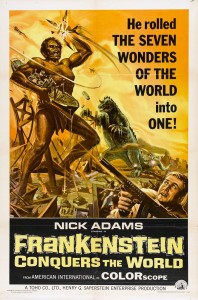


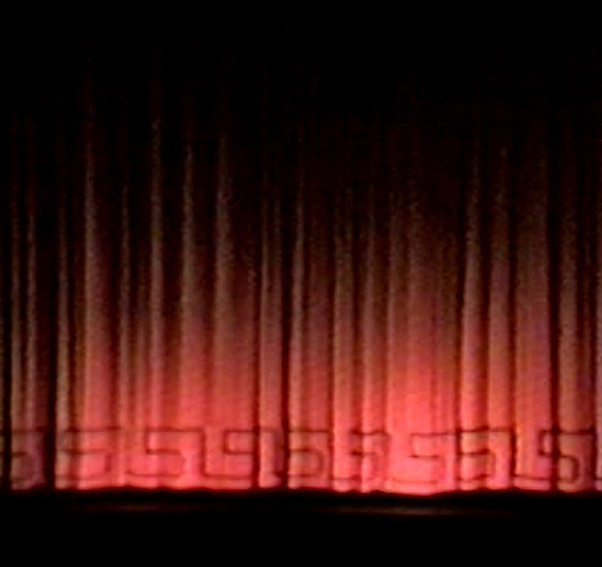
Recent Comments